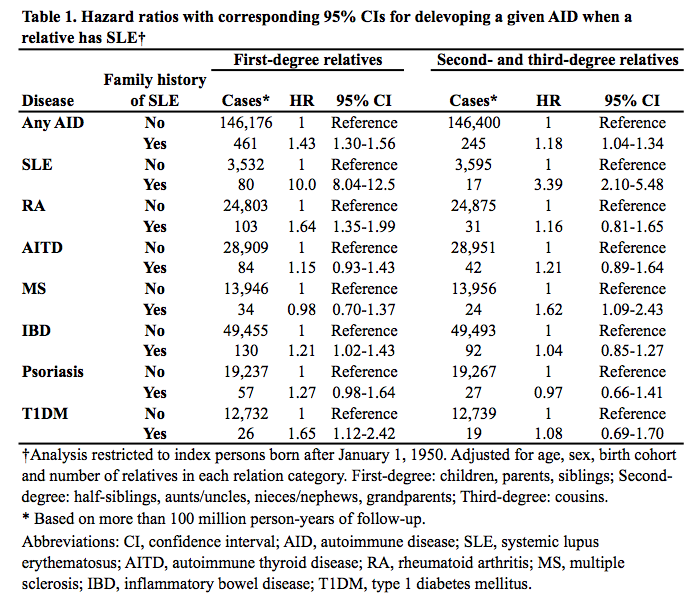Session Information
Date: Tuesday, November 10, 2015
Title: Epidemiology and Public Health IV: Risk Factors and Comorbidities for SLE and Psoriatic Arthritis
Session Type: ACR Concurrent Abstract Session
Session Time: 4:30PM-6:00PM
Background/Purpose: Systemic lupus erythematosus
(SLE) is a complex autoimmune disease (AID), which develops through the
interplay of genetic, epigenetic and environmental factors and may cluster
within families with other AIDs. Previous studies suggest that 4-12% of SLE
patients have a first-degree relative with SLE and 14-27% have a first-,
second- or third-degree relative with some AID. However, the relative risk of
SLE or other AIDs once a relative has been diagnosed with SLE has so far
remained unexamined.
Methods: All Danish citizens born after 1950 and
identified through the Civil Registration System were coupled to their
relatives through the parental link. Information regarding SLE and other AIDs
was obtained through linkage to the National Patient registry. Cohort members
were followed for SLE and other AIDs from 1997-2012 and hazard ratios (HRs)
with 95% confidence intervals (CI) were calculated through Cox proportional
hazards regression analyses.
Results: The cohort was followed for more than
100 million person-years of follow-up. In that time, 3,612 persons were
hospitalized with an SLE diagnosis. During follow-up, 80 first-degree relatives
of individuals with SLE developed SLE themselves (HR 10.0, 95% CI 8.0-12.5),
while 17 second- or third-degree relatives developed SLE (HR 3.4, 95% CI 2.1-5.5).
Overall, first-degree relatives had a slightly increased risk of any AID (HR
1.43, 95% CI 1.30-1.56), which was still significant among second- and
third-degree relatives (HR 1.18, 95% CI 1.04-1.34). For rheumatoid arthritis
there was a 64% increased risk among first-degree relatives (95% CI 1.35-1.99),
but not among second- or third-degree relatives (HR 1.16, 95% CI 0.81-1.65).
Furthermore, there was a slightly increased risk of inflammatory bowel disease
(HR 1.21, 95% CI 1.02-1.43) and type 1 diabetes mellitus (HR 1.65, 95% CI
1.12-2.42) among first-degree relatives and multiple sclerosis among second- or
third-degree relatives (HR 1.62, 95% CI 1.09-2.43).
Conclusion: There is a clearly increased risk of SLE
among relatives of SLE patients and to a lesser degree of other AIDs.
To cite this abstract in AMA style:
Ulff-Møller CJ, Simonsen J, Jacobsen S, Frisch M. Impact of Family History of Systemic Lupus Erythematosus on Risk of Autoimmune Diseases: National Cohort Study in Denmark 1977-2012 [abstract]. Arthritis Rheumatol. 2015; 67 (suppl 10). https://acrabstracts.org/abstract/impact-of-family-history-of-systemic-lupus-erythematosus-on-risk-of-autoimmune-diseases-national-cohort-study-in-denmark-1977-2012/. Accessed .« Back to 2015 ACR/ARHP Annual Meeting
ACR Meeting Abstracts - https://acrabstracts.org/abstract/impact-of-family-history-of-systemic-lupus-erythematosus-on-risk-of-autoimmune-diseases-national-cohort-study-in-denmark-1977-2012/

